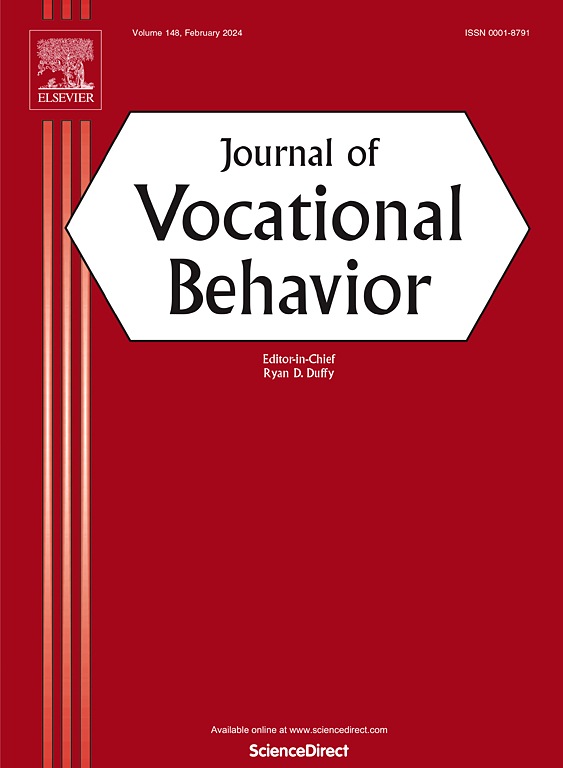No laughing matter: The motivational complexity of pursuing an aspirational self in non-standard work
IF 5.2
1区 心理学
Q1 PSYCHOLOGY, APPLIED
引用次数: 0
Abstract
Through an inductive study based on in-depth interviews with 50 female comedians, we develop a process model of how people pursue ambitious career goals in non-standard work. We adopt an identity lens to understanding ambition as pursuing an aspirational self, i.e., a possible self that the person sees as both highly desirable and highly improbable. We find that aspirational selves create a state of motivational ambivalence, in which people are caught between two conflicting motivations: to achieve their aspirational self and to protect themselves from likely failure. These conflicting motivations drive people to vacillate between promotion-focused enactment (enacting an aspirational self as a primary career, with significant resources and risks— “going all in”) and prevention-focused enactment (enacting an aspirational self through daydreaming or as a hobby, with limited resources and risks— “dipping one's toes”). Over time, these enactment experiences recalibrate individuals' assumptions surrounding what is desirable and possible, ultimately refining their understanding about what career success means and shifting the balance either in favor of promotion (in which case individuals commit to achieving their aspirational selves) or in favor of prevention (in which case individuals become demotivated and postpone or forego this pursuit). This model expands our understanding of possible selves, illuminates the complexity of the link between identity and motivation, provides novel insights into identity enactment, and offers several theoretical contributions to research on non-standard careers.
这可不是闹着玩的:在非标准工作中追求有抱负的自我的动机复杂性
通过对50位女性喜剧演员的深度访谈,我们建立了一个人们在非标准工作中追求远大职业目标的过程模型。我们采用认同的视角来理解野心是追求一个有抱负的自我,也就是说,一个人认为既非常理想又极不可能的可能的自我。我们发现,有抱负的自我创造了一种动机矛盾的状态,在这种状态下,人们被夹在两种相互冲突的动机之间:实现他们的有抱负的自我,并保护自己免受可能的失败。这些相互冲突的动机驱使人们在以促进为重点的行为(将有抱负的自我作为主要职业,拥有大量资源和风险——“全力以赴”)和以预防为重点的行为(通过做白日梦或将有抱负的自我作为爱好,拥有有限的资源和风险——“尝试”)之间摇摆不定。随着时间的推移,这些制定经验重新校准了个人对什么是可取的和可能的假设,最终完善了他们对职业成功意味着什么的理解,并改变了平衡,要么有利于晋升(在这种情况下,个人致力于实现他们的理想自我),要么有利于预防(在这种情况下,个人变得失去动力,推迟或放弃这种追求)。这个模型扩展了我们对可能自我的理解,阐明了身份和动机之间联系的复杂性,为身份制定提供了新的见解,并为非标准职业的研究提供了一些理论贡献。
本文章由计算机程序翻译,如有差异,请以英文原文为准。
求助全文
约1分钟内获得全文
求助全文
来源期刊

Journal of Vocational Behavior
PSYCHOLOGY, APPLIED-
CiteScore
13.10
自引率
5.40%
发文量
85
期刊介绍:
The Journal of Vocational Behavior publishes original empirical and theoretical articles offering unique insights into the realms of career choice, career development, and work adjustment across the lifespan. These contributions are not only valuable for academic exploration but also find applications in counseling and career development programs across diverse sectors such as colleges, universities, business, industry, government, and the military.
The primary focus of the journal centers on individual decision-making regarding work and careers, prioritizing investigations into personal career choices rather than organizational or employer-level variables. Example topics encompass a broad range, from initial career choices (e.g., choice of major, initial work or organization selection, organizational attraction) to the development of a career, work transitions, work-family management, and attitudes within the workplace (such as work commitment, multiple role management, and turnover).
 求助内容:
求助内容: 应助结果提醒方式:
应助结果提醒方式:


